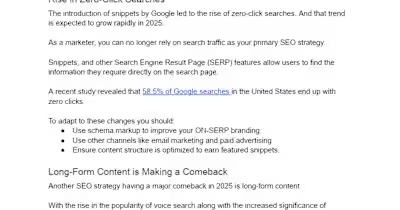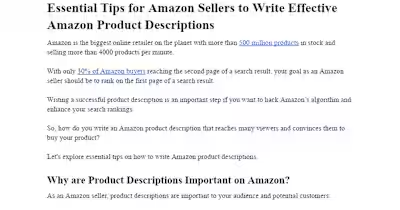How to use AI for On-page SEO - with tools to use.
How to Use AI for On-Page SEO
Introduction
If you depend on search engine optimization (SEO) to gain and convert traffic on your site, understanding AI SEO is important.
From keyword research, to meta tags, to adjusting the structure of your website, AI will help you push your website to the top of the search results.
What does that mean for your SEO strategy?
AI can help with certain SEO aspects like keyword research, content optimization, and perfomance analysis.
But, you cannot automate your entire SEO strategy.
Certain elements like creating backlinks, creating unique and engaging content, and understanding specific variations of your target audience requires human judgement.
So,it is important to blend the use of AI with human input to ensure a holistic approach to SEO.
Of course to enjoy these benefits you've got to know which AI tools for on-page SEO to use.
ChatGPT helps with generating high-quality content customized with specific keywords. It can also help with the creation of metatags and creating blog outlines.
Surfer SEO is especially useful in analyzing keyword density, internal linking and heading structures.
Frase highlights content gaps, improves content readability, and suggests relevant topics based on search trends.
Let’s quickly look at ways these AI tools can help boost your on-page SEO.
AI for Content Optimisation
Content optimization refers to the process of creating and revising content to ensure it ranks as high as possible in organic search.
Surveys conducted shows that more than 53% of business owners and marketers realized an increase in their engagement after optimizing their content.
AI helps you with two primary content optimization tasks:
Identifying the content that is performing badly and that requires updates
Updating content to enhance engagement and rank.
AI for Keyword Research and Keyword Optimisation
AI is a great tool for keyword research as it helps you brainstorm on keyword ideas. It does that through:
Suggesting seed keywords
Seed keywords are phrases or terms linked to your business that are a good starting point for your keyword research.
You have to choose your topic and then ask AI to suggest related keywords. Use keyword research tools like Ahrefs Keywords Explorer to assess the keyword difficulty and estimated traffic of the suggested terms.
Pick the seed keywords that have meaningful volume.
Analyze serp intent
AI can help you understand the various types of search intent in a specific SERP (search engine results page).
You can then decide the type of content you want to create based on the dominant intent.
For example, I copy/pasted page titles from the SERP for the keyword “SEO” and asked ChatGPT to classify them based on search intent.
ChatGPT classified them into categories, like definitional (explaining SEO) and informational guides.
You can further analyze the search traffic towards each intent. In this case, 82% of the traffic focuses on SEO informational guides.
You should opt for AI SEO tools like Surfer Keyword Research.
AI for generating title, headers and metas
Headers and Title
Headers and titles play an indirect SEO role by making certain your audience click and read your content. AI speeds the process of brainstorming headers and titles.
AI also analyzes hea
ders to suggest improvements, like adding secondary keyword or rearranging them for clarity---improving readability and SEO.
For example, breaking down a wide topic into smaller subheadings (e.g. "Advantages of Using Organic Beauty Products" rather than just "Organic Beauty Products")
Meta description
Good meta descriptions make searchers drawn to your page. However, Google tends to alter or rewrite most meta descriptions.
Using AI, you can create various meta descriptions for your content in no time by simply describing the content on your site.
For example, ChatGPT: “Create 10 meta descriptions under 150 characters for [keyword]. Address the user intent or pain point.
AI for Schema Markup Generation
Schema markup is important for content types like recipes and reviews as it helps your pages become desirable to Rich results-- a Google feature that incorparates a lot of extra data related to your content.
Such elements are easy to mess up using human input.
ChatGPT: “Create schema markup for this [article/product/service] page. [URL]”
Wrap Up
Any tool that promises to fully automate your SEO is lying. But, using AI for SEO can mininize
your workload and make the process much faster.
Using the tips above, you will take your on-page SEO to the next level.
Like this project
Posted Mar 20, 2025
How to Use AI for On-Page SEO Introduction If you depend on search engine optimization (SEO) to gain and convert traffic on your site, understanding AI SEO is…
Likes
0
Views
2





